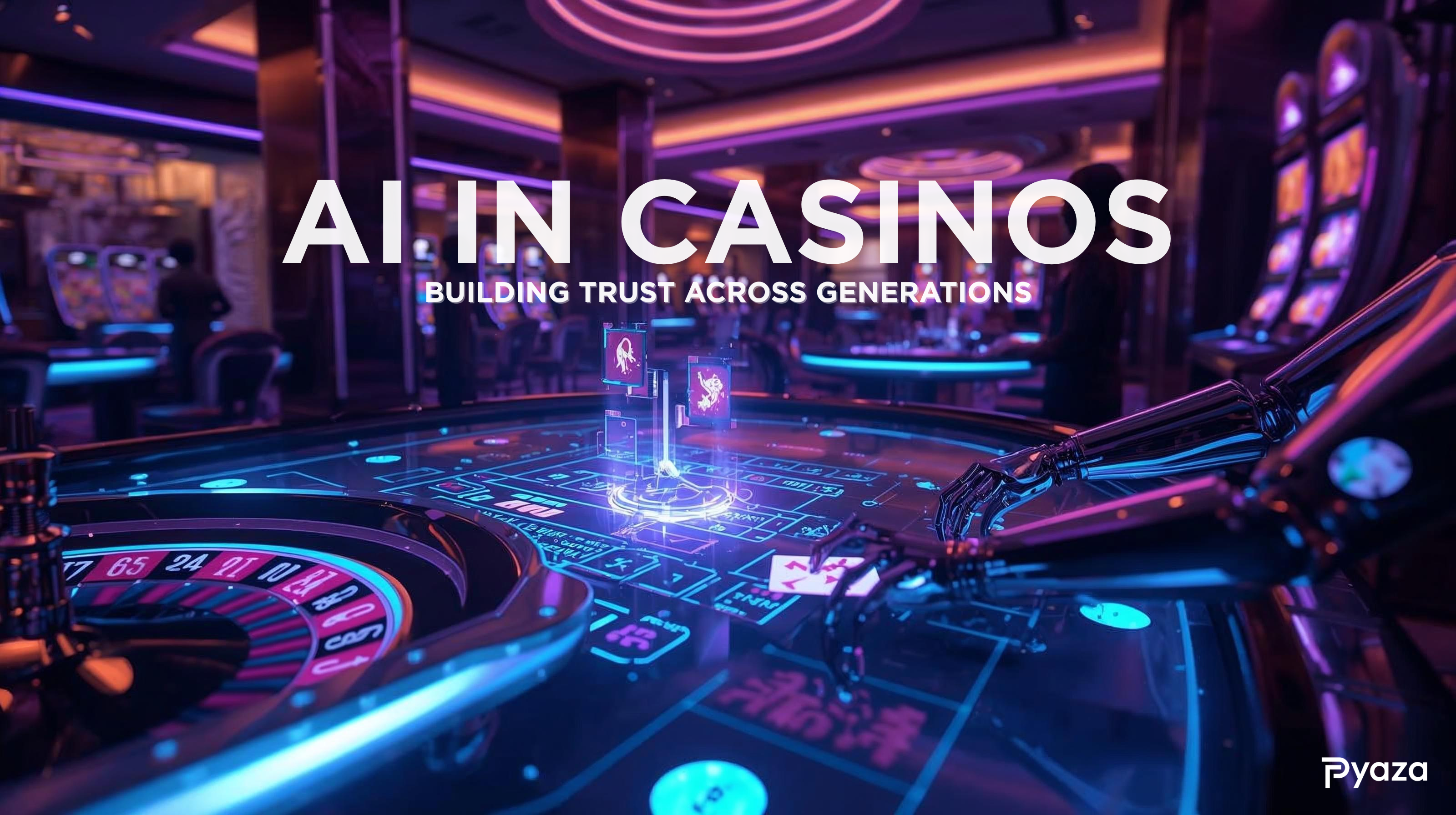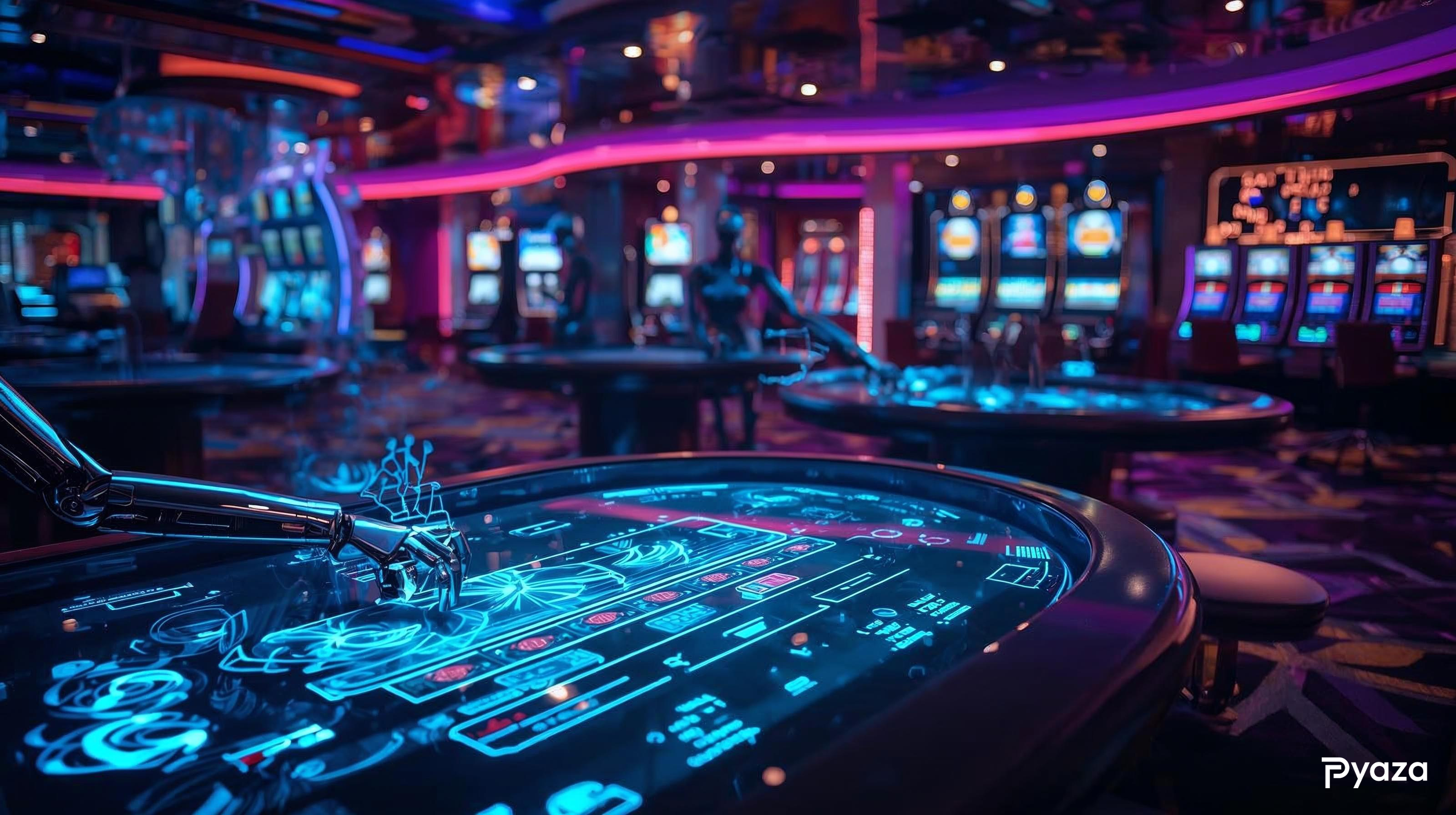AI in Casinos
Building Trust Across Generations
)
Miguel Spiteri
Marketing Manager - Pyaza
Introduction
Artificial Intelligence Building Trust Across Generations
Artificial intelligence is no longer limited to back-office analytics. It is now moving directly onto the casino floor, transforming how games are played and how operations are managed.
Today, AI is appearing in casino games through digital dealers and automated hosts in online and hybrid environments. These systems already handle routine interactions offering consistent play and personalized engagement.

The Expansion of AI on the Gaming Floor
Modern casinos are beginning to showcase AI beyond the invisible data layer. Virtual dealers, powered by natural language processing and real-time behavioral tracking, can run table games such as blackjack or poker while interacting with players in human-like ways. These AI hosts operate around the clock without fatigue, offering consistent service and adapting their style to individual preferences.
In parallel, automated oversight systems are monitoring table activity, detecting unusual behavior, and even providing insights to optimize staffing allocation. These systems promise faster decision-making and stronger security, yet their success depends on whether players and staff feel comfortable with this shift.
Different Generations, Different Expectations
Gen Z: Comfortable with Digital Interaction
For Gen Z, who grew up with apps and digital assistants, AI dealers feel natural. They value personalization and seamless integration with mobile experiences. However, transparency remains essential, as this generation wants clear proof that outcomes are fair and data is handled responsibly.
Millennials: A Blend of Tech and Authenticity
Millennials often balance convenience with the desire for genuine social interaction. They are more open to AI assistance than older groups but may still prefer a hybrid approach that keeps human staff involved in oversight and customer engagement.
Gen X and Baby Boomers: Trusting Human Oversight
For Gen X and Baby Boomers, the personal touch of live dealers and pit bosses carries meaning. Many remain cautious of full automation, fearing that algorithms could overlook context or prioritize profitability over fairness. To earn their trust, AI must complement rather than replace human authority.

Strategies to Bridge the Gap
Casinos can encourage adoption across age groups by focusing on:
Clear Communication: Demonstrating how AI ensures fairness and safeguards players through visible tools and certified systems.
Hybrid Oversight: Allowing AI to handle routine monitoring while human supervisors make judgment calls on complex situations.
Tailored Experiences: Adjusting the tone and behavior of AI dealers to reflect the expectations of different generations.
Education and Onboarding: Using tutorials, demonstrations, and mobile previews to ease players into the concept of AI-led experiences.
Practical Uses of AI on the Casino Floor
Some of the key applications already being tested include:
Virtual Dealers that deliver consistent play while adapting to user preferences.
AI Oversight Systems that monitor tables for fraud or unusual patterns, boosting security but sometimes raising privacy concerns.
Dynamic Game Allocation where AI directs players to tables based on flow and preference, improving efficiency but potentially reducing spontaneity.
Human-AI Teams where staff remain central, supported by AI insights to improve decision-making.
Looking Ahead
The future of casino operations is not about replacing humans with machines, but about finding the right balance. Regulators and players alike will expect AI systems to be transparent, regularly audited for fairness, and clearly positioned as tools that enhance, not undermine, the human element of gaming.

Final Thoughts
AI-driven casino floors are becoming a reality, yet their acceptance depends on more than technical capability. To succeed, casinos must implement systems that are transparent, flexible, and respectful of generational preferences. The future will belong to operators who use AI not to erase the human element, but to enhance it, creating environments where technology builds trust rather than undermines it.
Already, we are seeing more automated and artificial data collection and monitoring on the casino floor, from advanced surveillance systems to real-time player behavior analytics. The next step seems inevitable: the introduction of more machines and robotic systems directly into the player experience. Robots are imminent, and if the integration between AI and robotics becomes seamless, we may even see the emergence of physical AI-powered dealers.
The big question is whether this shift will resonate with players. For some, the novelty and precision of AI dealers might be appealing, while for others, the absence of authentic human interaction could diminish the traditional casino experience. The balance lies in how technology is positioned... not as a replacement for people, but as an enhancement that adds efficiency, personalization, and fairness while keeping the social and human aspects of gaming alive.
Download the Pyaza APP to follow our coverage, connect with the team, and get involved in upcoming creator campaigns.